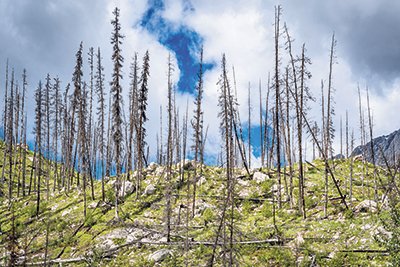The recipe for wildfire – which applies everywhere on Earth – requires three ingredients: vegetation (fuel), ignition and conducive fire weather. While all three are subject to change, trends in extreme fire weather cause particular alarm. In Canada, the average area burnt annually by wildfires has quadrupled since the 1970s. In the past three years alone, almost 8 per cent of the country’s forests have burned.
Read MoreAdvancing a resource project from exploration to production requires steps that range from securing financial and community support to navigating regulatory requirements. Almost inevitably, the process is lengthy, with various factors determining progress.
Read MoreCanada’s nuclear sector is calling for immediate federal and provincial action to overhaul regulatory processes and clarify financing, warning that bureaucratic delays could derail the massive energy expansion needed to meet national climate goals.
Read MoreCanada is undertaking bold nation-building projects to secure our future. Today, Canadians have a rare opportunity to be part of one of the most significant conservation opportunities in our country’s history: one that delivers economic and environmental benefits across the country and around the world.
Read MoreWhat if you could donate to a charity of your choice and – at the same time – support the local resource industry?
Accelerating philanthropic impact and mineral exploration with flow-through share financing
Across Canada, there is a heightened focus on advancing resource sovereignty, with a spotlight on the critical minerals needed for energy security.
Read MoreAt a time when Canadian governments are implementing measures to strengthen the nation’s economy in an uncertain world, stakeholders in the organic agricultural sector are calling for concerted action to unlock the full potential of organic agriculture.
Read MoreWhen areas in Bedford, Nova Scotia, experienced more than 250 millimetres of rain in just days in July 2023, the resulting devastation caused country-wide alarm. Considered one of the highest impact flash floods in Canadian history, the incident served as a stark reminder how extreme weather events increasingly place communities at risk.
Read MoreBeneath Canada’s vast landscapes lies a powerful driver of prosperity – gold and precious metals. While their gleam may symbolize wealth and tradition, it’s their economic impact that shines brightest today. This sector powers regional economies, attracts billions in investment and anchors the livelihoods of hundreds of thousands of Canadians.
Read MoreClimate change will create new security challenges and magnify existing ones in Canada and around the world, according to a comprehensive defence review published by the government last year.
Read MoreOn this Earth Day, the significance of forests for conservation, community benefits and human health has never been more urgent to acknowledge. Forests play many critical roles for nature and people: they provide habitat for hundreds of species, act as water filters, reduce air pollution, and are places of community connection, recreation and refuge. They regulate temperature and weather patterns, and remove carbon dioxide from the atmosphere.
Read MoreBuffeted by external and internal pressures, Canada’s mineral industry faces a precarious moment. At a time of an escalating trade conflict with the U.S. and resulting economic uncertainty, the sector is also subject to intensifying tax pressures, stricter foreign investment rules and mounting regulatory challenges from within Canada.
Read MoreBy 2031, Canada expects to see 17,700 new job openings for welders – part of a nationwide growth in demand for skilled tradespeople that’s driven by two key trends: the continued increase in construction and infrastructure projects in the country, and the impending retirement in the next few years of an estimated 700,000 workers across different trades.
Read More“New year – new you” is a slogan that resonates with many of us as the calendar flips over into January. It is the time to set new goals, and resolutions related to fitness and wellness often top the list.
Read MoreData-driven decision-making can help to improve outcomes for any project or business – and bring benefits for reducing risks and errors, improving efficiency and resource allocation – and enhance transparency and scalability.
Read MoreTools for allowing farmers to select the best animals for resilient herds and sustainable beef production
An impressive array of tools – from data analytics and precision agriculture to livestock vaccines, crop development, genomic selection and more – is ushering in the future of farming.
Read MoreAccording to modelling by Clean Energy Canada, a climate and clean energy program within the Morris J. Wosk Centre for Dialogue at Simon Fraser University in British Columbia, and Navius Research, Canadian jobs in clean energy are set to grow 7 per cent a year, from 509,000 in 2025 to 2.7-million in a net-zero 2050.
Read MoreEcosystem and community health
Creating stronger outcomes, meeting community needs at the University of Northern British Columbia
From its base in Prince George, the University of Northern British Columbia (UNBC) is working to improve health outcomes in local communities, including in older populations, with an approach that integrates the health of people, communities and the natural environment. Beyond contributing to stronger and more resilient northern communities, these efforts are also contributing to advances in research and innovation at the society level.
Read MoreWith its decades-long record of delivering low-cost, safe and efficient energy supply, CANDU nuclear reactors are an existing solution to the urgent need for emission-free electricity generation, according to the recently launched Canadians for CANDU campaign.
Read MoreHarvesting triple wins
University of Saskatchewan-led research and technology applications enhance environmental, social and economic outcomes in farming systems
Read MoreInspiring reflections on what trees mean to us
Canada is widely known as a forest nation, but do Canadians really value this abundance? Or does it take news like the devastating forest fires for people to consider the critical role forests play – not only in our daily lives but also in addressing climate change?
Read More



















